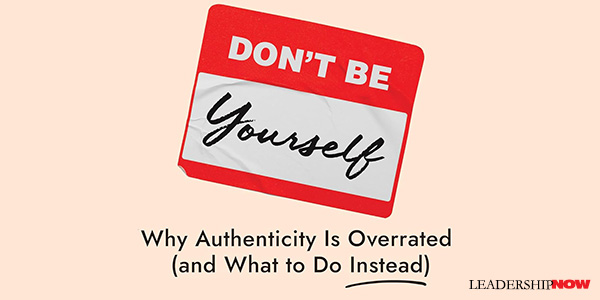 |
 |
11.07.25

Don’t Be Yourself
THE groundwork for the modern cult of authenticity was laid in our era by philosophers like Rousseau and others of his mindset who followed him. Their idea that any constraints laid on us or attempts to conform us by society make us inauthentic. But the fact is, we find out who we are in relation to other people and the communities in which we interact. Our uninhibited self is rarely our best self. In Don’t Be Yourself: Why Authenticity Is Overrated (and What to Do Instead) published by Harvard Business Review Press, author Tomas Chamorro-Premuzic asks, “What if chasing authenticity was an actual trap—one that oversimplifies human complexity, disregards the necessity of compromise, and leaves us ill-equipped to navigate the nuanced realities of modern life, which include focusing not just on ourselves and how we feel, but also on others?”` Our uninhibited, authentic self can hold us back from the potential we have. Contrary to what the authenticity cult predicates, success is rarely attained through radical honesty or by always showing every single side of ourselves. Instead, it’s a function of carefully managing your self-presentation—adapting to situations and showcasing the qualities that are best appreciated by others—while making an effort to conceal negative, undesirable, and irrelevant aspects of your personality. Chamorro-Premuzic presents us with four authenticity traps that encourage us to be our unfiltered selves regardless of the situation and refuse to compromise. The Four Authenticity Traps
Instead… You will be more successful if you keep these thoughts in mind:
The common thread here is humility and an other-focus. As leaders, the more you focus on yourself, the less you will care about the needs of those you lead. Your leadership becomes narcissistic. Focusing on being nice, ethical, and competent, and being perceived as trustworthy by others, especially followers, leaders often view authenticity as an end goal, as if it was a critical enabler of their success. However, focusing too much on authenticity—in this case, adhering too closely to the “just be yourself” mantra—will foster a narcissistic mindset that is not conducive to leadership effectiveness. Instead, leaders would be better off if they focused on being other-oriented, so as to understand how other people think and feel in order to enable them to work together. The question is, how can we best display our character and humanity in a way that is most beneficial to our goals and objectives? By shifting our perspective, beyond the assumption that others value our unfiltered or genuine self per se, we can unlock more effective strategies for navigating the complexities and cultural nuances of work and life. This approach, while less self-serving, comforting, or self-obsessed, empowers us to be more intentional about how we present ourselves, communicate, and connect with others. It allows us to balance sincerity with adaptability, personal values with professional demands, and emotional truth with strategic thinking. In doing so, we can become more effective, better performers who rise to challenges with an awareness of our limitations, better leaders who inspire trust and collaboration, and better coworkers who contribute meaningfully to shared goals. 
Posted by Michael McKinney at 08:22 AM
|
BUILD YOUR KNOWLEDGE
 

How to Do Your Start-Up Right STRAIGHT TALK FOR START-UPS 
Grow Your Leadership Skills NEW AND UPCOMING LEADERSHIP BOOKS 
Leadership Minute BITE-SIZE CONCEPTS YOU CAN CHEW ON 
Classic Leadership Books BOOKS TO READ BEFORE YOU LEAD |